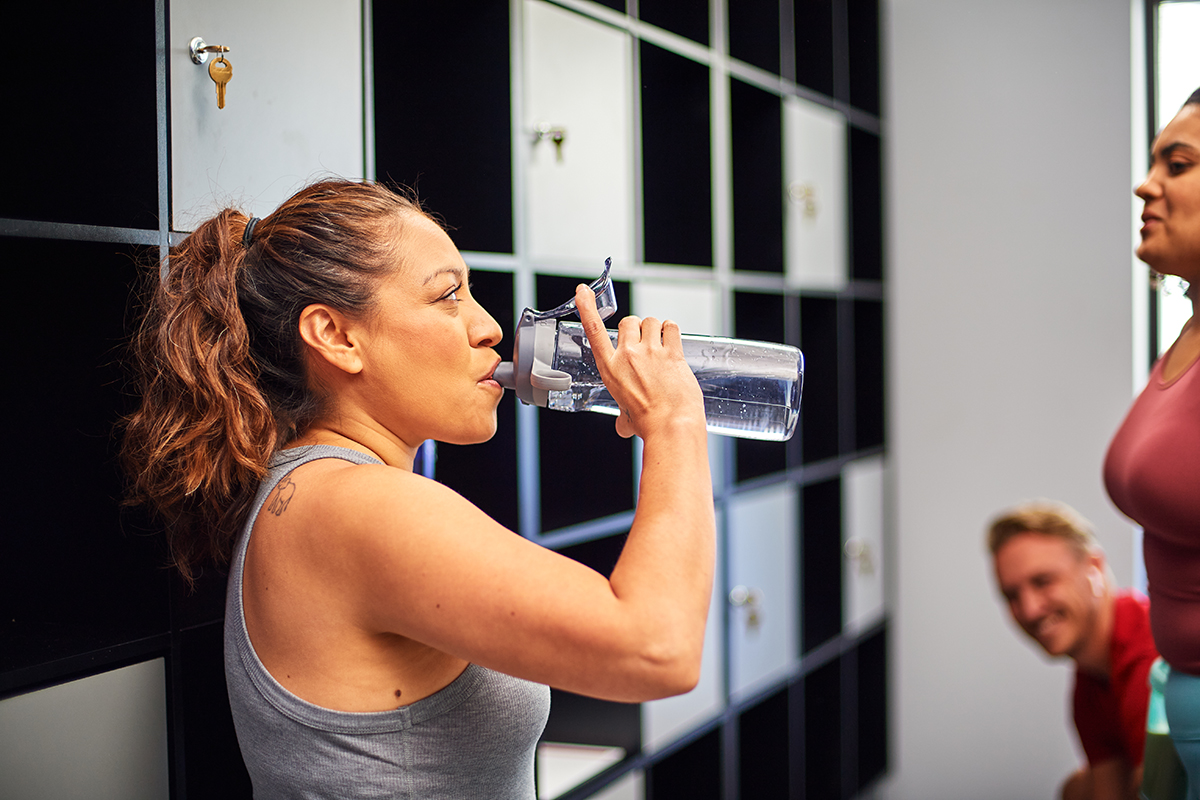Just as it requires work to keep your body strong, it’s important to give your mind the TLC it needs to feel its best. But with the daily stressors and pressures of life, it can sometimes feel overwhelming to figure out how to take care of your mental health in the first place.
Fortunately, whether you deal with a specific mental health condition or just want ways to help deal with life’s ups and downs, we recommend giving these a try:
- Move your body
- Eat a well-balanced diet
- Stay hydrated
- Get good sleep
- Prioritize connections
- Practice mindfulness or meditation
- Give back
We’ll cover all of these mental health tips in more detail below. But first, let’s dig into the research that links physical health and mental health. Then, we’ll compare mental and emotional health.
Why mental health matters to your overall health
Mental health matters. It’s intricately linked to your overall well-being. According to the Centers for Disease Control and Prevention, depression can increase the risk of chronic health problems like heart disease, diabetes, and stroke. Suffering from a mental health condition can also make you more likely to suffer from a sleep disorder like insomnia or sleep apnea.
Taking care of your mental health is as important as taking care of your physical health when it comes to maintaining your overall well-being.
The difference between mental and emotional health
Though people sometimes use the two terms interchangeably, mental health and emotional health refer to two different things. Mental health is an overarching term that includes your emotional, psychological, and social well-being. It impacts how you think, feel, and act. Emotional health is just one aspect of mental health, and refers to your ability to cope with both positive and negative emotions.
How does exercise improve mental health?
If you’re wondering how to take care of your mental health, moving your body is a great place to start. While there are plenty of reasons to love working out, many people love the feel-good rush they get after a workout. That’s because when you exercise, you release endorphins — hormones that help boost your mood, relieve pain, and reduce stress.
Exercise has even been scientifically proven to help reduce symptoms of depression: a Harvard Public Health study found that running for 15 minutes per day or walking for an hour per day each lowered the risk of major depression by as much as 26%.
Working out can also be beneficial for anxiety, since it’s a physical way to relieve tension and built-up stress. Whether you’re getting some cardio in, lifting weights, or taking a yoga class, moving your body is one of the best things you can do for your mind.
How To Take Care of Your Mental Health: 7 Things To Try Today
You don’t have to be going through a mental health crisis to start prioritizing your well-being. In fact, practicing some of these simple actions on a daily basis can help improve your ability to cope with problems and challenges in the first place. While you should always speak with a healthcare professional if you feel your mental health is impacting your quality of life, these quick wins can serve as daily mood boosts to help you feel better fast.
1. Get regular exercise

Yep, we’ll say it again: Exercise is your brain’s best friend! Not only does exercise release endorphins, but it can sometimes serve as a positive outlet for stressors. Plus, as you hit the gym and feel more confident in your workouts, it’s naturally motivating to see the progress you’re making.
If you’re feeling like you’re in a workout rut and your mood is impacting your ability to exercise, start with something low-impact and low-pressure, like walking or a gentle yoga session. You’ll remember how good it feels to move your body, and that’s a fantastic first step.
2. Focus on nutrition

If you’ve ever noticed a mood boost after eating healthy foods, we’re not surprised! The link between nutrition and mental health is stronger than you might even realize.
Recent research suggests that the gut functions like a second brain. That’s because roughly 95% of your serotonin is made in the gastrointestinal tract, and this tract is also packed with millions of nerve cells that communicate with the “good” bacteria in your microbiome. These bacteria not only help you absorb nutrients, but also fire up neural pathways directly to your brain.
It makes sense that what you eat has such a direct impact on your mental health. In fact, a 2019 study published in the American Journal of Clinical Nutrition showed that increasing vegetable and fruit intake can help reduce symptoms in people dealing with clinical depression. Focusing on eating a variety of fruits and vegetables each day — along with whole grains, fiber, and lean protein — can benefit your gut health and contribute to a happier mind.
On the flip side, if you’re aiming to boost your mental health, you might want to steer clear of these bad-mood culprits. Overdoing it with any of the following may hurt your mental health:
- Alcohol. Alcohol is a depressant, which can alter the balance of neurotransmitters in your brain, altering your thought patterns. If you’re dealing with depression or just facing a low period in your life, it may pay off to abstain from drinking until you’re feeling better.
- Caffeine. If you’re struggling with anxiety, caffeine could actually be a contributing factor. It naturally speeds up normal body functions such as your heartbeat — and noticing these physiological symptoms can worsen anxiety symptoms for some people. Consider cutting back your daily caffeine intake, and you may find an improvement in how you feel.
- Refined sugar. Satisfying your sweet tooth can have a negative impact; that’s because research shows that diets high in refined sugar are harmful to the brain, and can worsen some mood disorders.
- Processed foods. Eating a diet high in processed foods has been linked to an increase in anxiety and mild depression symptoms. Try to opt for minimally or unprocessed, whole foods like whole grains, leafy greens, fruits, nuts, and lean protein instead.
3. Hydrate for your mental health

Did you know that dehydration can increase your risk of developing depression or anxiety? It makes sense when you consider the brain is made up of between 80% and 85% water — and a lack of water prevents your brain from getting enough tryptophan, the amino acid used to create serotonin.
Though individual hydration needs may vary, a common guideline comes from the National Academies of Science, Engineering, and Medicine, who suggest the following intake amounts for men and women:
- Roughly 15.5 cups (3.7 liters) of fluids a day for men
- Roughly 11.5 cups (2.7 liters) of fluids a day for women
You could also get those fluids from other beverages, as well as many foods. Also, hydration needs may be more individual than a common guideline; you might need to drink more or less water depending on factors like:
- Exercise. Any sweat-inducing workout will require extra water to make up for the fluids you lose. Be sure to hydrate before, during, and after exercising.
- Illness. When your body is trying to fight off an infection or other illness, you’ll need to up your water intake to support its efforts.
- Pregnancy or breastfeeding. Pregnant and breastfeeding women generally need more water intake to support the nutritional and developmental needs of their fetus or baby.
- Climate. When the temperature goes up, it’s time to up your water intake: Excessive heat or humidity can make you sweat more and increase your risk of dehydration. You may also need to drink more water if you’re adjusting to high altitudes.
Tip: Aim to drink water continuously throughout the day, such as once per hour, rather than only when you feel thirsty. Staying properly hydrated can help you feel your best.
4. Get enough sleep

Getting adequate rest each night is necessary to reset our brains and help us tackle what life throws at us. While you probably don’t need a scientific study to remind you that getting a good night’s rest is good for your mood, there has been research that proves a lack of sleep increases negative emotional responses to stressors.
According to a study from the Columbia University Department of Psychiatry, a lack of sleep “can make it much more difficult to cope with even relatively minor stressors, and can even impact our ability to perceive the world accurately.”
Sleep is essential to emotional regulation and processing, so aiming to get the recommended 7 to 9 hours per night can go a long way in helping you feel more balanced. This amount is just a general guideline — you may find you function best with slightly less or more than that baseline. It’s all about finding what’s best for your body and your mood.
5. Prioritize connection

Spending time with friends and family, being active in your community, and making sure you feel socially connected are important for staying physically and mentally healthy. That’s because social ties are one of the best predictors of longevity.
This might have something to do with the fact that connectedness is a proven way to boost your mental health — research shows that people who feel more connection to others have lowered risks of anxiety and depression.
Be proactive about scheduling the next group hang or one-on-one meetup with a friend. If you live far apart, pick up the phone for a FaceTime or a call. Even a quick quick chat can help boost feelings of connectedness and well-being. Another great way to bond with your pals? Take them to the gym! Group workouts give you and your friends the benefits of community and motivation while getting in some much needed quality time.
6. Practice mindfulness or meditation

Mindfulness is our ability to be present in the current moment, whatever it happens to bring. You can practice mindfulness while eating, walking, or going about any daily task simply by tuning into the present and being fully absorbed in what you’re doing.
Practicing mindfulness has been shown to reduce anxiety and depression by reducing stress levels and boosting your brain’s ability to relax — both of which are ultra-beneficial to one’s mental health.
Meditation is another practice you can use to reduce stress and center your mind. Though there are many different types of meditation, a simple place to start is by sitting in a comfortable position, closing your eyes, and focusing on your breath for five minutes. As thoughts come up, gently observe them without attaching judgments and then come back to your breathing.
The science behind meditation
It sounds simple, but this daily practice can have a big impact. Meditation can increase positive emotions and has even been found to change certain areas of the brain linked with depression.
That’s because the medial prefrontal cortex becomes hyper-aroused in people suffering from depression. This is the part of the brain that processes information about yourself, such as worrying over past or future events. Another area of the brain associated with depression is the amygdala, which elicits your fight-or-flight response. These two parts work off of each other during episodes of depression. The good news is that research shows meditation helps break the connection between these regions, potentially improving depressive symptoms.
Not sure where to begin with meditation?
Try a guided meditation or yoga session through Apple Fitness+ and take the guesswork out of the process. Anytime Fitness members get free access to an Apple Fitness+ subscription.* Learn more here.

7. Give back
Perhaps you’ve heard before that doing things for others can help you feel better about yourself. It’s not just a nice sentiment: giving back is a proven way to boost your brain’s feel-good capacity. That’s because it stimulates your brain’s mesolimbic pathway — or “reward center” — as it releases endorphins. This leads to what the Cleveland Clinic describes as a natural “helper’s high,” one that can boost feelings of happiness and self-esteem.
Get involved with a local charity or cause you believe in. This will help you cultivate gratitude for everything you have and feel that satisfaction of knowing you’ve helped someone in need. Not sure where to start? Sites like Charity Navigator can help you search by causes you care about.
More healthy lifestyle tips to feel better
Your physical, mental, and emotional well-being are all interconnected and rely on one another. In general, maintaining a healthy lifestyle can help improve your mental health and keep you feeling balanced and happy. Here are more ways to improve your overall well-being on a daily basis:
- Focus on the positive. It’s easy to get stuck in a downward spiral when we only pay attention to the things that are going wrong. By starting to notice all the things going right in your day — the roof over your head, the love of friends or family — you can start to improve your mood and feel better.
- Avoid substances. When your mood is low, alcohol or other substances may exacerbate feelings of depression or anxiety. Switching to a non-alcoholic option while you work on your mental health is a good option.
- Schedule some time to do nothing. Today’s fast-paced world is swept up in constant productivity and output; it has left many of us feeling that we’re living in a cycle of stress and being in fight-or-flight mode. Carving out time to “do nothing” can feel daunting at first, but it can be an important reset for your mental health. Steal away a few hours or a whole day if you can for a mental health reset. Don’t make any plans, and don’t try to tackle anything on your to-do list. Simply focus on relaxing activities that can help you decompress.
- Let it out. Finding a way to release and process your feelings each day is important. Whether through journaling, meditation, breathwork, or any other activity that lets you reflect on how you feel, taking the time to sit with your feelings is a great way to release them and feel better.
A final word on taking care of your mental health
Taking care of your mental health is just as important as taking care of your physical and emotional well-being. If you find yourself struggling with persistent negative thoughts or feel stuck and unsure of what to do, reach out for support. Everyone needs a little help getting back on track sometimes, and speaking with a licensed professional can help you find ways to feel better and take care of your mind.
Need to speak with someone fast? The Mental Health Hotline (866-903-3787) offers free and confidential assistance 24/7 to anyone struggling with mental health issues.
More mental health articles
When you need help figuring out how to take care of your mental health, we’re here. Explore more mental health articles and tips that can help you find new ways to feel better today:
Group training sessions give you the benefit of community and motivation. These social connections are important for your mental health. Find the Anytime Fitness location nearest you to get your free trial pass.
Terms & Conditions
* Offer open to existing Anytime Fitness® members of participating locations in the United States and Canada, only. Offer valid for access to Apple Fitness+℠, access begins on eligible device activation and continues for 3 months. Fitness+ requires a subscription and Apple ID with payment card on file. Reactivation of the offer is required every 3 months to maintain access. If free access ends, payment card on file will be charged $9.99/month USD and $12.99/month CAD and subscription automatically renews until canceled. Apple may change the subscription price at its discretion, other terms and Apple Privacy Policy apply; see the applicable terms at https://www.apple.com/legal/internet-services/itunes/. Offer requires use of the Anytime Fitness mobile application. Offer limited to 1 subscription per Family Sharing group, Apple IDs already associated with a trial or subscription for Fitness+ are not eligible. Valid only for Fitness+ in the United States and Canada. Fitness+ requires iPhone 8 or later with iOS 16.1 or later, or Apple Watch Series 3 or later with watchOS 7.2 or later paired with iPhone 6s or later with iOS 14.3 or later. Fitness+ is a registered trademark of Apple Inc. Apple is not a sponsor of this promotion. No cash value, not valid with any other offer, no refunds or credits. Each Anytime Fitness location is independently owned and operated. Void where prohibited.



